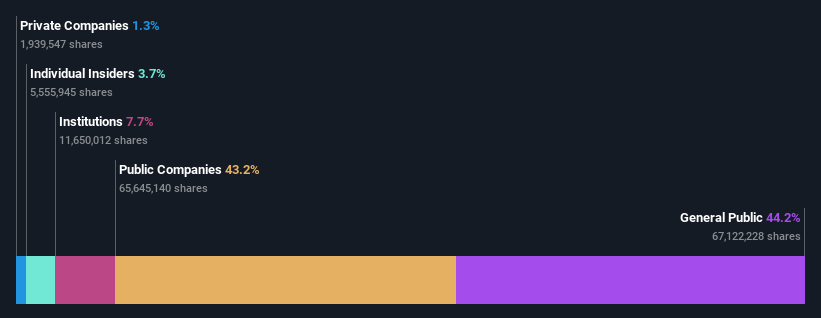Brickworks Limited's (ASX:BKW) market cap dropped AU$120m last week; Retail investors bore the brunt
Key Insights
The considerable ownership by retail investors in Brickworks indicates that they collectively have a greater say in management and business strategy
50% of the business is held by the top 6 shareholders
Analyst forecasts along with ownership data serve to give a strong idea about prospects for a business
To get a sense of who is truly in control of Brickworks Limited (ASX:BKW), it is important to understand the ownership structure of the business. And the group that holds the biggest piece of the pie are retail investors with 44% ownership. That is, the group stands to benefit the most if the stock rises (or lose the most if there is a downturn).
And last week, retail investors endured the biggest losses as the stock fell by 3.1%.
Let's take a closer look to see what the different types of shareholders can tell us about Brickworks.
Check out our latest analysis for Brickworks
What Does The Institutional Ownership Tell Us About Brickworks?
Institutional investors commonly compare their own returns to the returns of a commonly followed index. So they generally do consider buying larger companies that are included in the relevant benchmark index.
We can see that Brickworks does have institutional investors; and they hold a good portion of the company's stock. This can indicate that the company has a certain degree of credibility in the investment community. However, it is best to be wary of relying on the supposed validation that comes with institutional investors. They too, get it wrong sometimes. It is not uncommon to see a big share price drop if two large institutional investors try to sell out of a stock at the same time. So it is worth checking the past earnings trajectory of Brickworks, (below). Of course, keep in mind that there are other factors to consider, too.
Brickworks is not owned by hedge funds. Washington H. Soul Pattinson and Company Limited is currently the company's largest shareholder with 43% of shares outstanding. Robert Millner is the second largest shareholder owning 2.2% of common stock, and The Vanguard Group, Inc. holds about 2.0% of the company stock.
We also observed that the top 6 shareholders account for more than half of the share register, with a few smaller shareholders to balance the interests of the larger ones to a certain extent.
While studying institutional ownership for a company can add value to your research, it is also a good practice to research analyst recommendations to get a deeper understand of a stock's expected performance. Quite a few analysts cover the stock, so you could look into forecast growth quite easily.
Insider Ownership Of Brickworks
The definition of an insider can differ slightly between different countries, but members of the board of directors always count. The company management answer to the board and the latter should represent the interests of shareholders. Notably, sometimes top-level managers are on the board themselves.
Most consider insider ownership a positive because it can indicate the board is well aligned with other shareholders. However, on some occasions too much power is concentrated within this group.
Shareholders would probably be interested to learn that insiders own shares in Brickworks Limited. The insiders have a meaningful stake worth AU$138m. Most would see this as a real positive. If you would like to explore the question of insider alignment, you can click here to see if insiders have been buying or selling.
General Public Ownership
The general public, who are usually individual investors, hold a 44% stake in Brickworks. This size of ownership, while considerable, may not be enough to change company policy if the decision is not in sync with other large shareholders.
Public Company Ownership
It appears to us that public companies own 43% of Brickworks. This may be a strategic interest and the two companies may have related business interests. It could be that they have de-merged. This holding is probably worth investigating further.
Next Steps:
It's always worth thinking about the different groups who own shares in a company. But to understand Brickworks better, we need to consider many other factors. For instance, we've identified 3 warning signs for Brickworks (1 is a bit concerning) that you should be aware of.
If you are like me, you may want to think about whether this company will grow or shrink. Luckily, you can check this free report showing analyst forecasts for its future.
NB: Figures in this article are calculated using data from the last twelve months, which refer to the 12-month period ending on the last date of the month the financial statement is dated. This may not be consistent with full year annual report figures.
Have feedback on this article? Concerned about the content? Get in touch with us directly. Alternatively, email editorial-team (at) simplywallst.com.
This article by Simply Wall St is general in nature. We provide commentary based on historical data and analyst forecasts only using an unbiased methodology and our articles are not intended to be financial advice. It does not constitute a recommendation to buy or sell any stock, and does not take account of your objectives, or your financial situation. We aim to bring you long-term focused analysis driven by fundamental data. Note that our analysis may not factor in the latest price-sensitive company announcements or qualitative material. Simply Wall St has no position in any stocks mentioned.


